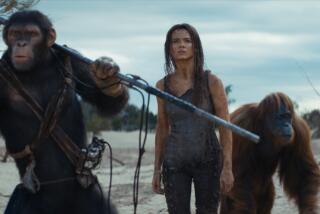The ‘King’ of Adventure
- Share via
Even though big-screen re-releases of selected vintage films are quite the regular feature of the current theatrical market, the revival of John Huston’s 1975 “The Man Who Would Be King” is especially welcome both because of what it isn’t and what it is.
Playing at the Nuart in West Los Angeles for a week starting Friday (as well as available on video), this version of the Rudyard Kipling short story about abortive empire building on the fringe of the Raj--considered among the author’s best by writers such as William Faulkner and James Joyce--is not a certified classic film like Alfred Hitchcock’s recently revived “Vertigo” or Martin Scorsese’s “Mean Streets.” Nor is it the kind of gold-plated money machine that “Star Wars” was on its re-release and that Paramount hopes “Grease” will become from here on in.
Rather, the rousing, high-spirited “The Man Who Would Be King” represents exactly what we’ve been missing in today’s movie market. That would be intelligent popular entertainment that makes smart use of major stars like Sean Connery and Michael Caine and doesn’t assume everyone in the audience is dead from the neck up. Wide-screen action and adventure don’t get much more satisfying than this.
Perhaps unexpectedly, this film’s irresistible high spirits were created not by a hoard of eager youths but rather by a large number of veteran craftspeople. Composer Maurice Jarre, wardrobe designer Edith Head, production designer Alexander Trauner, cinematographer Oswald Morris and even legendary matte painter Albert Whitlock brought almost bottomless experience and skill to bear on the Kipling material.
Riding herd on them all was director and co-writer (with longtime collaborator Gladys Hill) Huston, then nearly 70 years old, who added not only his own lifetime’s worth of experience but also a temperament and sensibility closely allied to the film’s raffish protagonists.
Huston, for openers, was not known to be the nicest guy in the world: When “King” co-star Saeed Jaffrey (playing the loyal retainer Billy Fish) spent a moment commiserating with an assistant director who’d had his ribs broken by a mule, the director shouted, “What in the hell do you think you’re doing there, Saeed? Giving that boy a French kiss?”
With this kind of blackly jocular sensibility and the sang-froid of a riverboat gambler, Huston completely understood the mind-set of his heroes and probably would have been as at ease in the Back of the Beyond as he was behind the camera.
In fact, making a film out of the Kipling short story had been an ambition of Huston for 25 years, and he’d originally thought of Clark Gable and Humphrey Bogart for the leading roles. As a result, Huston and co-writer Hill were well-prepared to supply sharp dialogue that brought the characters to colorful life without being artificial or insipid.
It does not hurt, of course, to have actors like Connery and Caine playing Daniel Dravot and Peachy Carnehan, a pair of scoundrelly former British army sergeants in 1880s India, cheeky bastards possessed of unlimited nerve and bravado. Both actors are overflowing with the stylish self-confidence needed to carry off these roles, plus the moxie to make period exclamations such as “God’s holy trousers!” seem like the most natural phrases in the world.
Another casting success, though it’s not always noted, is using a forceful actor like Christopher Plummer in what might otherwise be a subservient role, that of the writer Kipling, whose experiences frame the “King” story.
The film opens with Kipling scribbling away in the offices of his employer, India’s Northern Star newspaper. A battered, unrecognizable beggar creeps in, croaks, “I’ve come back,” and demands a drink. When Kipling insists he doesn’t recognize him, the beggar reminds the writer of a contract he witnessed “three summers and a thousand years ago” and proceeds to narrate the story we see in flashback. Kipling and Peachy Carnehan, for that’s who the beggar is, first met when Peachy lifted the writer’s watch in a train station but soon returned it when the fob identified Kipling as a fellow Mason. Peachy and his boon companion, Daniel Dravot, have “knocked about India a bit” since leaving the service, but however disreputable their current activities might be, they don’t let anyone forget “it’s the likes of us that built this bloody empire.”
Because, Peachy says, “we are not little men,” and because, Daniel adds, “Peachy and me, we don’t kill easy,” these two have determined on a daring scheme. They will walk through Afghanistan (as inhospitable then as now) and go to neighboring Kafiristan in the hopes of establishing themselves as kings. Informed by a dubious Kipling that no one has accomplished that since Alexander the Great, Peachy shoots back, “If a Greek can do it, we can do it.” (Political correctness and this film are not exactly on speaking terms.)
After outwitting bandits and outlasting bad weather, Peachy and Daniel arrive in that distant land, where several strokes of luck lead to things going much better than they had a right to expect. If everything stayed that sunny, however, theirs wouldn’t have been much of a story nor this much of a film.
Huston, with his cynical view of human nature, was a good fit for Kipling’s cautionary tale of how greed and vanity prove the undoing of everyone they touch. Though Peachy and Daniel agree they “wouldn’t say the world’s a better place for our being in it,” the cinematic world is more pleasant for having spawned this ripping yarn: It’s a pleasure to have it back among the living.
BE THERE
“The Man Who Would Be King,” Nuart, 11272 Santa Monica Blvd., W. Los Angeles. Friday through next Thursday. $5-$8. (310) 478-6379.
More to Read
Only good movies
Get the Indie Focus newsletter, Mark Olsen's weekly guide to the world of cinema.
You may occasionally receive promotional content from the Los Angeles Times.











